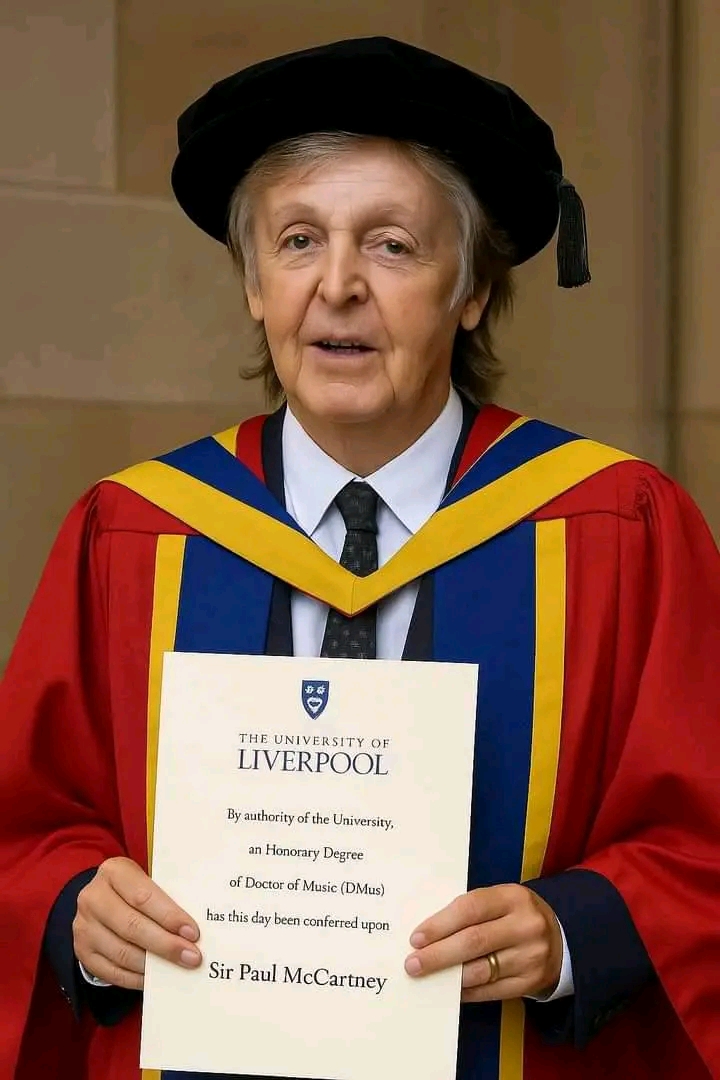Sir Paul McCartney Honored with Honorary PhD by the University of Liverpool for His Contributions to Music and Culture
In a momentous occasion that celebrated both his legendary career and his enduring influence on music and popular culture, Sir Paul McCartney was awarded an honorary Doctor of Philosophy (PhD) by the University of Liverpool. The ceremony took place amidst a gathering of distinguished academics, students, and music enthusiasts, underscoring the university’s recognition of his outstanding and sustained contributions to the arts.
A Lifetime of Musical Innovation
Sir Paul McCartney, born in Liverpool in 1942, is undoubtedly one of the most influential musicians of the 20th and 21st centuries. As a founding member of The Beatles, he played a pivotal role in revolutionizing popular music, shaping the soundscape of the post-war era, and influencing countless artists across genres and generations.
Throughout his career, McCartney has demonstrated exceptional versatility—not only as a singer and bassist but also as a songwriter, composer, and performer. His work with The Beatles produced a vast repertoire of timeless classics such as “Hey Jude,” “Let It Be,” “Yesterday,” and “A Day in the Life,” which continue to resonate with audiences worldwide.
Recognition Beyond Music
While his musical achievements are well-documented, the university’s decision to confer an honorary PhD reflects recognition of his broader cultural impact. Sir Paul has been an advocate for numerous social causes, including animal rights, environmental issues, and peace initiatives. His philanthropic efforts, including support for charitable organizations and campaigns, exemplify his commitment to making a positive difference beyond the stage.
The Ceremony and Speech
During the ceremony, Sir Paul McCartney expressed humility and gratitude for the honor. He reflected on his Liverpool roots, acknowledging how the city and its vibrant music scene shaped his early years and musical journey. He also emphasized the importance of creativity, perseverance, and community in his career.
In his acceptance speech, he paid homage to his bandmates, John Lennon, George Harrison, and Ringo Starr, highlighting their collaborative spirit and mutual influence. “Music is a universal language that brings people together,” he remarked, “and I am proud to have contributed to that shared human experience.”
Academic Significance of the Award
The conferral of a PhD—a degree typically associated with advanced academic research—on a musician underscores the evolving recognition of arts and culture within academic institutions. It signifies an acknowledgment that contributions to music are not merely entertainment but also a form of cultural scholarship that influences society at large.
The University of Liverpool’s decision aligns with a broader trend of universities honoring individuals who have made significant cultural contributions, bridging the gap between academia and the arts. It also serves as an inspiration to students and emerging artists, illustrating that creative pursuits are valuable and worthy of scholarly recognition.
Community and Cultural Impact
Liverpool, Sir Paul’s hometown, has long been celebrated as a hub of musical innovation. The city’s rich cultural heritage, exemplified by venues like The Cavern Club where The Beatles first performed, continues to thrive. The university’s recognition of Sir Paul McCartney reflects its pride in local icons and its commitment to fostering a vibrant cultural identity.
Furthermore, the award emphasizes the importance of arts education and the need to nurture creative talents. By honoring a figure who embodies artistic excellence and social consciousness, the university promotes values of innovation, resilience, and cultural appreciation.
Conclusion
Sir Paul McCartney’s receipt of an honorary Doctor of Philosophy from the University of Liverpool is a fitting tribute to a career that has spanned over six decades, transforming the landscape of music and popular culture. It celebrates not only his artistic genius but also his dedication to social causes and his role as an ambassador of creativity.
As he continues to perform, compose, and inspire, this honor cements his legacy as a cultural icon whose influence transcends generations and borders. The university’s recognition serves as a reminder that the arts are fundamental to societal progress and that pioneers like McCartney deserve acknowledgment for their profound contributions to human expression.



